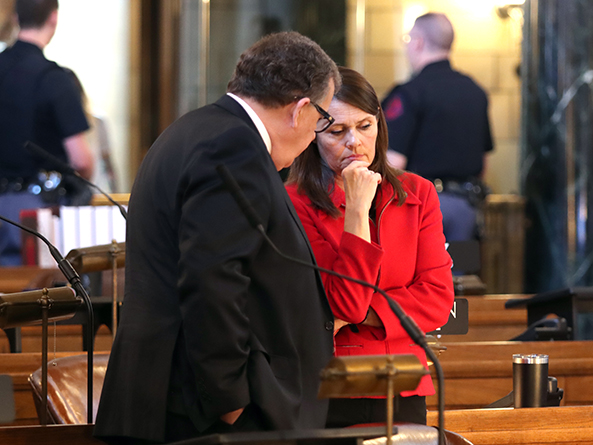Ban on gender-altering procedures for minors advanced to final round after cloture
Senators advanced a measure to the final round of consideration April 13 to ban “gender-altering” care for minors in Nebraska after a successful cloture vote and a pledge from the bill’s sponsor to continue working toward a compromise.

LB574, introduced by Omaha Sen. Kathleen Kauth, would prohibit physicians in Nebraska from performing or referring an individual under age 19 for gender altering procedures, including surgical procedures, hormone therapy and puberty blockers.
A physician who knowingly violates the bill’s provisions would be subject to review by the state’s medical licensing board. An individual who received a gender-altering procedure while under age 19, or their parent or guardian, could bring a civil action against the physician within two years of discovery.
The bill also would prohibit the distribution or use of state funds for any entity, organization or individual that provides gender-altering procedures for minors. The provisions of LB574 would take effect on Oct. 1, 2023.
Kauth and other supporters of the bill argued that the measure would protect children from “experimental” treatments with life-long consequences. She claimed that 85 percent of children desist from gender dysphoria if they receive psychological rather than medical intervention.
“This an instance where these drugs and these surgeries are too harmful for kids with no proven benefit,” Kauth said. “Childhood and teen years are a time of trial and error — figuring out who you are — that changes frequently, and adults know that allowing children to make permanent, life-altering decisions is unwise.”
Niobrara Sen. Barry DeKay said he has spoken to Nebraskans who support and oppose the bill, as well as individuals who transitioned but later regretted that choice. Speaking in support of LB574, he said the measure would “slow down” the process for minors, allowing them to make decisions regarding gender-affirming care once they become adults.
“Personally, I believe people have the right to live their lives in a manner and a way that they choose,” DeKay said. “At the same time, I feel that we’re going too far, too fast when it comes to providing gender-affirming care and treatments to minors — especially those [treatments] with permanent or irreversible effect.”
Opponents suggested the measure would harm children and families and warned against setting a precedent of authorizing the Legislature to intervene between parents and doctors in any health care decision.
Omaha Sen. John Fredrickson urged senators to take a “bigger picture” view of the impact of LB574. Years down the road, he said, other lawmakers may look to the bill as a precedent regarding the limits of parental rights when it comes to health care decisions.
“We really need to consider the precedent that we set,” Fredrickson said. “With this bill, we are saying that the government can overrule the parents.”
Sen. Danielle Conrad of Lincoln also opposed the bill, calling it a “radical” and “partisan” measure that reflects national culture wars and not the “kitchen table” issues that Nebraskans care about.
“Nebraskans are not crying out for this hateful, harmful, divisive measure,” Conrad said.
After four hours of debate, Kauth offered a motion to invoke cloture, which ceases debate and forces a vote on the bill and any pending amendments. The motion was adopted on a vote of 33-16. Thirty-three votes were needed.
Kauth then asked senators to vote against her amendment that would have narrowed the bill to a ban on physicians providing irreversible “gender-reassignment” surgery to anyone younger than 19.
She said she would work instead to put together a compromise amendment that could be considered on the last round of debate and that was she was “committed to sitting down and figuring out how to make this bill better.”
Bills on final reading cannot be amended, but senators may vote to return a bill from final reading to select file for consideration of a specific amendment.
Lincoln Sen. George Dungan remained opposed to the bill, but supported the idea of a good-faith effort to find common ground. He stressed, however, that those conversations must include representatives on both sides of the issue.
“In order to have negotiation and compromise, there needs to be an actual conversation,” Dungan said. “I’m hesitant — I’m nervous — but I’m hopeful that we can continue talking.”
After senators defeated the pending Kauth amendment on a vote of 11-28, they voted 33-16 to advance LB574 to final reading.


